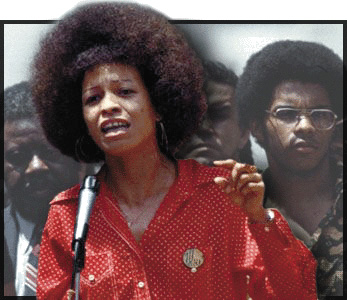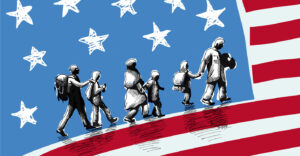STANDING AGAINST UNJUST WAR—In this May 10, 1967 file photo, Muhammad Ali, former world heavyweight boxing champion, speaks at an anti-war rally at the University of Chicago in Chicago. (AP Photo/Charles Harrity, File)
1839—Cinque (original name Senghbe), after being kidnapped and sold into slavery, is placed on the Spanish slave ship Amistad. The son of a King of the Mende (Mendi) tribe in West Africa would lead the most successful revolt on a slave ship during the entire history of the slave trade. The Amistad was captured by the slaves who killed the captain and attempted to sail the ship to Africa. But due to delaying tactics by the remaining White crew, the ship was captured by a U.S. naval ship. Cinque and the rebellious slaves were taken to New Haven, Conn., and put on trial for murder. Amazingly they won their case and were allowed to return to Africa.
1971—Muhammad Ali is allowed to box again after winning a victory in the United States Supreme Court. The court overturned his conviction for refusing to be drafted and serve in the United States war in Vietnam. When asked how he could claim to be a pacifist opposed to war while being a professional boxer, Ali’s most frequent response was, “I am not going 10,000 miles from here to help murder and kill and burn poor people to help continue the domination of White slave masters over the darker people.”
1978—The United States Supreme Court hands down the Bakke Decision which undermined affirmative action programs that had been designed to give preference to Blacks and other minorities in education and industry in order to compensate for decades of past discrimination. Although the court ruled affirmative action programs were constitutional; it struck down the use of quotas and that had the effect of weakening the affirmative action programs.
1970—NAACP Chairman Stephen Gill Spottswood creates a national controversy by telling the annual convention of the civil rights organization that the administration of President Richard Nixon was “anti-Negro” and was pursuing policies “inimical to the needs and aspirations” of African-Americans.
1972—The United States Supreme Court rules in a historic five to four decision that as it was being carried out in America, the death penalty was “cruel and unusual punishment” and thus violated the Constitution. The ruling also suggested that the death penalty was racist. At the time 483 of the approximately 600 people waiting to be executed in the nation were Blacks or members of other minority groups. However, since the decision, at least 38 states and the federal government have re-instituted the death penalty by supposedly meeting Supreme Court guidelines.
1847—Dred Scott (and his wife, Harriet) files his famous lawsuit in St. Louis Circuit Court arguing that after living with a slave master for several years in non-slave territories, they should be considered free. After several twists and turns, the case makes its way to the United States Supreme Court where the court rules against Scott and Justice Roger B. Taney writes what may be the most racist decision ever rendered by the court. Taney wrote that Scott was “private property” and had no right to sue in federal court. He also declared that Blacks were not citizens of America and never could be. Then he topped the decision by writing of Scott and all Blacks, “being of inferior order, and altogether unfit to associate with the White race…they have no rights which the White man is bound to respect.”
1917—Glamorous Singer-Actress Lena Horne is born in Brooklyn, N.Y., to an upper-income Black family. She would perform with Jazz greats such as Artie Shaw, Teddy Wilson, Billy Strayhorn and Duke Ellington. She also became the first African-American woman to sign a long-term contract with a major Hollywood studio. But she became disenchanted with Hollywood and returned to her nightclub career. She is best known for her 1940s hit “Stormy Weather.” In her later years she became active in civil rights including participation in Martin Luther King Jr.’s historic 1963 March on Washington. Horne died on May 9, 2010 at the age of 92.
1967—Major Robert H. Lawrence is named the first Black U.S. astronaut in the NASA space program. The Chicago-born Lawrence would later die under somewhat mysterious circumstances during a training exercise in December 1967.
1974—A deranged Black man, Marcus Chennault, shoots and kills the mother of Dr. Martin Luther King Jr. at the Ebenezer Baptist Church in Atlanta. Along with Alberta Christine Williams King, a church deacon was killed and another church member wounded. Chennault, a Dayton, Ohio, native, reportedly claimed that Black Christians were deceiving and misleading Black people.

1995—Song-stylist and singer Phyllis Hyman commits suicide in New York City shortly before she was scheduled to perform at a concert. Hyman was one of the premier female vocalists of her day. The reasons for her suicide were unclear. She left a note which read in part “I’m tired. I’m tired.” Hyman was 45—six days short of her 46 birthday—when she died.
July 1
1863—Walter Francis White is born in Atlanta, Ga. For nearly 25 years White was one of the most influential Black leaders in the nation. He headed the NAACP from 1931 to 1955. However, he first received national attention because of the way he looked. As a light-complexioned Black man with blue eyes, White was able to infiltrate racist groups and investigate planned brutality against Blacks. But in 1919, he barely escaped with his life while attempting to investigate the deadly Elaine Race Riot in Phillips County, Ark., which had left more than 200 Blacks dead. Somehow the mob discovered that White was in the area and set out to lynch him. But he was able to catch a train back to Little Rock before he could be identified. While on the train, the White conductor told him he was leaving town too early because the mob had discovered “a damn yellow Nigger passing for White and the boys are going to get him.” White would die in New York City in 1955. His autobiography is entitled “A Man Called White.”
1899—Thomas Andrew Dorsey is born in Villa Rica, Ga. Dorsey is widely credited with being the “Father of Gospel Music.” During the early 1930s, after leaving Atlanta for Chicago, Dorsey combined gospel and the blues while performing under the name “Georgia Tom.” He wrote more than 400 gospel and blues songs including his most famous “Precious Lord, Take My Hand.” He died in Chicago in 1993 at the age of 96. Once asked to comment on his life, Dorsey said, “I had hope, faith, courage, aspiration and most of all determination to accomplish something in life.”
1777—Vermont becomes first U.S. territory to abolish slavery. By 1783, New Hampshire and Massachusetts had followed Vermont’s lead. The abolition of slavery was formally placed in the Vermont Constitution, which was formally adopted on July 8, 1777. A major force in the early abolition movement was a group known as the Rights of Man Movement.
1822—Denmark Vesey and five of his co-conspirators are hanged in Charleston, S.C. Vesey’s “crime” had been the organization of the largest slave rebellion in American history. But the insurrection was betrayed by a “house slave” before it could be implemented. Vesey was actually a former slave who had purchased his freedom.
1908—Thurgood Marshall is born in Baltimore, Md. Marshall would go on to become chief counsel for the NAACP and the lead attorney in the Brown v. Board of Education case, which led to the desegregation of the nation’s schools. President Lyndon Johnson would, in June 1967, nominate him to be the first African-American Justice on the United States Supreme Court because as Johnson put it, “It was the right thing to do and the right time to do it.”
1943—Lt. Charles Hall became the first African-American pilot to shoot down a Nazi warplane during World War II. Hall was from Brazil, Ind.
1775—Prince Hall founds African Lodge Number One—the first Black lodge of Free Masons in the United States. Hall would become the pioneer builder of Black Masons in America. He was also a leading voice against slavery and for Black rights in the North.
1962—The first Black man permitted to play Major League Baseball, Jackie Robinson, is named to the Baseball Hall of Fame.
1922—Samuel L. Gravely is born. Gravely became the first African American admiral in the United States Navy and the first African American to command a U.S. warship. The Richmond, Va., native died in 2004 at the age of 82.

1972—College professor and activist Angela Davis is acquitted of charges that she assisted and conspired with the young men involved in a deadly 1970 shootout at the Marin County courthouse in California. The assault on the courthouse was an attempt to free imprisoned Black activist George Jackson. At least three people were killed during the escape attempt. Davis, a Birmingham, Ala., native who became a member of the Communist Party, spent 16 months in prison but on this day in 1972 she was found not guilty of all charges by an all-White San Jose, Calif., jury.
1973—Arna Bontemps dies at the age of 72 in Nashville, Tenn. Born in Louisiana, Bontemps became one of the key figures in the Black artistic and cultural movement known as the Harlem Renaissance of the 1920s and 1930s. Bontemps was a prolific writer and poet.








